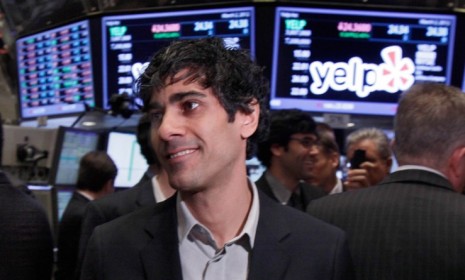Yelp's soaring stock: 3 takeaways
Many social-media companies are having a rough time on the stock market, but the reviews site Yelp is proving to be an exception

A free daily email with the biggest news stories of the day – and the best features from TheWeek.com
You are now subscribed
Your newsletter sign-up was successful
This week, early investors in the online reviews site Yelp got a chance to finally sell their shares after a six-month "lockup" period that followed Yelp's stock market IPO. Shareholders braced themselves for a wave of sell-offs: After all, early investors in Facebook, the biggest social media company in the world, dumped their shares en masse after its lockup, causing Facebook's stock to plummet. However, Yelp's early investors held onto their shares — and the stock soared by 22.5 percent, bucking a slump for social media companies on the stock market. Here, three takeaways from Yelp's stellar stock performance:
1. Investors believe in Yelp
"When given the opportunity to take their money and run, early investors and executives" gave Yelp a "collective vote of confidence," says Jennifer Van Grove at VentureBeat. Analysts say the already-popular site, which allows users to post reviews of neighborhood businesses and restaurants, could soon become a household name, as it launches a "partnership with Apple to integrate local content into software for the iPhone and iPad," says Danielle Kucera at Bloomberg.
The Week
Escape your echo chamber. Get the facts behind the news, plus analysis from multiple perspectives.

Sign up for The Week's Free Newsletters
From our morning news briefing to a weekly Good News Newsletter, get the best of The Week delivered directly to your inbox.
From our morning news briefing to a weekly Good News Newsletter, get the best of The Week delivered directly to your inbox.
2. But there may be trouble on the horizon
"Yelp faces the same challenges of other young internet companies," says Evelyn M. Rusli at The New York Times. Yelp relies on businesses for revenue (customers can access the site for free), with vendors given "the option to spend money on advertisements or other services." However, while revenue is rising, "only a fraction of businesses with profiles on Yelp — about 4 percent — pay the company anything." Like Facebook and Groupon, Yelp still has to show investors that it has a sustainable model for revenue.
3. The stock benefited from short-selling
Lots of investors anticipated that Yelp's stock would plummet once the lockup expired, leading them to take short positions on the stock, meaning they bet that the share price would fall. However, when it became clear that the price was actually climbing, the short-sellers needed to hedge their earlier bets. So they quickly began buying Yelp stock in an attempt to balance their pessimistic gambles and prevent huge losses. Dubbed a "short squeeze," the dynamic likely boosted Yelp's stock significantly.
A free daily email with the biggest news stories of the day – and the best features from TheWeek.com
Sources: Bloomberg, The New York Times, The San Francisco Chronicle, Seeking Alpha, VentureBeat, The Wall Street Journal
-
 The ‘ravenous’ demand for Cornish minerals
The ‘ravenous’ demand for Cornish mineralsUnder the Radar Growing need for critical minerals to power tech has intensified ‘appetite’ for lithium, which could be a ‘huge boon’ for local economy
-
 Why are election experts taking Trump’s midterm threats seriously?
Why are election experts taking Trump’s midterm threats seriously?IN THE SPOTLIGHT As the president muses about polling place deployments and a centralized electoral system aimed at one-party control, lawmakers are taking this administration at its word
-
 ‘Restaurateurs have become millionaires’
‘Restaurateurs have become millionaires’Instant Opinion Opinion, comment and editorials of the day